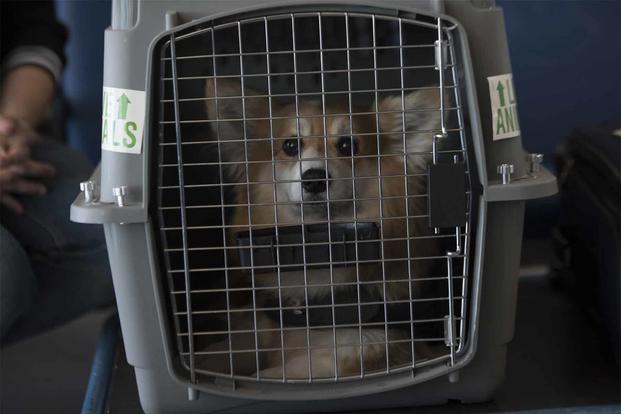Military move officials did not have an update Friday on if or when troops might receive help paying to move their pets as part of a permanent change of station move.
A senior Pentagon official told families in May that he would be "looking into" a pet shipping fee reimbursement. But Rick Marsh, the deputy director for strategic plans, policy and logistics at U.S. Transportation Command on Friday declined to comment on whether reimbursement was still under consideration.
Read Next: Navy Names New Class of Frigates, Pays Tribute to Iconic Warship
"That's a personnel and entitlement issue that it wouldn't be appropriate for me to speculate on," Marsh said during the annual Military Family Caucus Summit, which was live streamed Friday.
While the costs of moving family members to and from duty stations are covered by the Defense Department through allotments or reimbursements, moving pets is not. New military move restrictions, stop-movement orders and commercial airline carrier changes triggered by the COVID-19 pandemic have left some military family members paying thousands of dollars to move pets to and from their overseas duty stations.
Still, Marsh said relocating troops and military families over the course of the COVID-19 pandemic has forced military transportation officials to refocus their policies on the people being moved instead of just the logistics of moving.
"Traditionally we've been focused on moving people’s stuff, the logistics," Marsh said. "A forcing function of COVID was, there's unprecedented communications between the personnel community and the transportation folks on what is a personnel issue that just happens to have a really big logistics component to it."
That refocus paired with the continued fallout from a disastrous 2018 moving season has pushed officials to roll out a variety of updates to how families experience moves and work with moving contractors. Those changes include a requirement that movers pass background checks; higher reimbursements for personally procured moves; more choices around repair or replacement for damaged items; clearer communication processes and a single point of contact; longer damage claims windows and faster processing; and in-transit alerts.
Officials are also working harder to make sure families know their rights when working with packing and moving contractors, Marsh said.
"It wasn't a new authority, but I just don't think we ever articulated very well ever before that ultimately you're in control of who comes in your house," he said. "You have the authority to say 'stop,' and get someone to help you."
Marsh said while they still expect more feedback on the 2020 summer moving season, customer satisfaction appears to have improved when compared to prior years.
"I'm not ready to declare victory yet, but we have seen some improvement in our customer satisfaction scores," he said. "Two or three years ago, we were in the low nineties as far as customer satisfaction. Right now we’re at about 96%. I anticipate that will drop as we get more surveys in from the summer move cycle."
-- Amy Bushatz can be reached at amy.bushatz@military.com.
Related: Pentagon Considers Reimbursing Pet Shipping Costs During Pandemic












